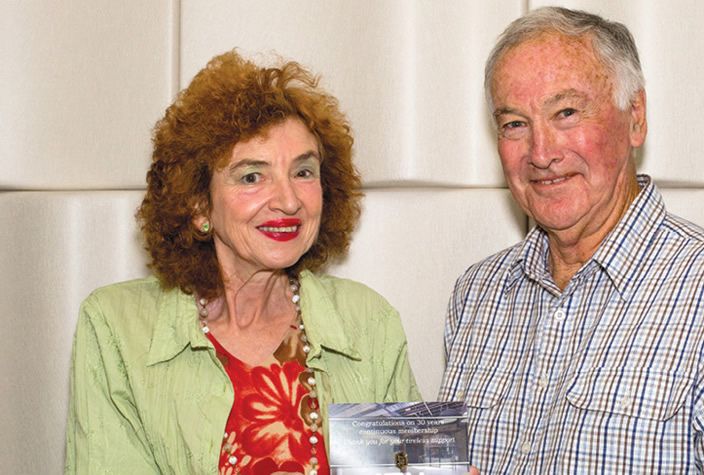
Many South Coast Branch members would be familiar with John Tubridy, who recently received his 30 year membership badge from the IEU.
John retired in 2007 as Acting Director of Wollongong CEO, but he was also well known as a Principal and as IEU Principals Rep for the South Coast Branch.
Since his ‘retirement’, John has been consulting for various agencies of the Catholic Church in areas such as child protection and school counselling, and doing relieving principal stints at a number of schools.
John said going back to work on a flexible basis was a great experience, but at 69 years old his ‘proper’ retirement might be calling.
He is well qualified to consult on issues of child protection and welfare as he spent many years working in a young offenders school and in ‘special’ schools.
He started teaching with the Christian Brothers and then Marist Brothers in the 1970s, but attracted by the better salaries offered in the public system, moved to Daruk Training School for young offenders.
He taught “whatever they wanted me to teach” at the school for 13 to 16 year old boys. Students were at the school for about five months before returning home.
From there he was promoted as principal of Ormond Special School then Reiby Special School. In these schools he was responsible for supporting teaching staff to provide educational programs for children who were behaviourally and emotionally challenging.
“I became heavily involved with the Teachers Federation while I was there. We were quite militant,” John said.
“We were pushing for the schools in the institution to be classified as special schools and for us to be managed by the Department of Education.
“We used to go and see a lot of parliamentarians with the Teachers Federation. I can remember getting kicked out of Rex Jackson’s office.”
The Federation was eventually successful and the special schools and their teachers came under the management of the Department of Education.
In the 1980s John became Principal at Glenfield Park Special School in Liverpool, a school for children who could not cope with mainstream education, due to intellectual disability or social or emotional issues.
Again a residential school with dormitories, John was challenged to change the culture of treating students. Rather than ‘nurses’ looking after children in dormitories he preferred the staff be seen as house parents. Corporal punishment in dormitories was deemed inappropriate and stopped.
“These changes caused an enormous amount of fuss. But I had to put the children first. I was trying to normalise life as much as possible.’’
John brought in other changes such as allowing the children to go home at weekends in an attempt to reduce institutional nature of the school.
In 1986 John moved back into the Catholic system as Assistant Principal at St Peter and Paul’s Primary School, Kiama.
“What a change. It was a lovely school by the beach. I think some of the staff thought I was too soft on the kids.
“After my years dealing with challenging children, if someone got caught talking in class it didn’t seem like such a big deal to me.”
John then was appointed to the principal’s position at St Francis Xavier Primary School in Wollongong, which again was different to his previous school.
“This was a very multicultural school with 30 different nationalities.
“It was a fantastic school, so rich.”
After a short stint at St Pius X Primary School, Unanderra, John became Principal at St Michael’s Primary School, Nowra – the first lay principal, taking the reins from the Good Samaritan nuns.
He ended up staying 10 years. It was a school of 650 children and was such a vibrant school in every way.
“This was also a diverse school with a high Indigenous population and a lot of navy families.”
“I came from a working class Irish family who always believed in unions. Being the Principals Union Rep kept me at the cutting edge. I knew the stresses and strains principals were facing and I could raise issues about principals with the executive.
Being open and honest and wanting the best for principals, I never felt any conflicts in my Union role with my professional life.”
In 2001 John became Head of a Cluster of 14 primary schools for Wollongong CEO, working alongside then Director Greg Whitby.
“I loved that role, being able to get out there and support staff and principals in different primary schools. That suited me.”
From 1995 to 2002 John represented the Wollongong Diocese as a Commissioner on the NSW Catholic Education Commission. In retirement John continues to work casually when requested for various projects. John and his wife have three grandchildren who bring them lots of fun.
He is a keen golfer and also pursues his song writing and performing with his band at Folk Festivals.
One of the proudest achievements of his career was mentoring and encouraging staff, particularly support staff. He encouraged Carolyn Collins to become more active in the Union. She has been IEU Vice President, Support Staff for a number of years.
“My wife is a school secretary and I always thought support staff should be represented more.
“I’m really proud Carolyn has gone on to do such a great job.”
John organises an annual get together for retired school staff from Wollongong CEO at Wollongong Golf Club at the beginning of each year. Get in touch with him at jtubridy@optusnet.com.au .







































































































































